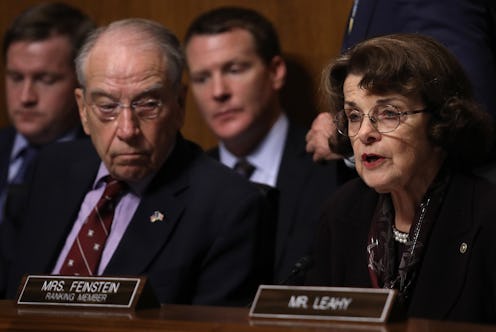News
The Chances Of Kavanaugh's Confirmation Vote Getting Filibustered Just Changed

If Mitch McConnell's motion to invoke cloture receives the support of a majority of senators on Friday, a final vote on Brett Kavanaugh could happen on Saturday. Considering the highly contentious nature of Kavanaugh's confirmation hearings, you might be wondering whether the Senate can filibuster a Supreme Court nominee. In short, the answer is yes — unless the Senate passes a cloture motion, which would thwart Democrats' filibuster plans.
A filibuster is a strategy designed to disrupt progress on issues (like judicial nominations) being considered by a legislature. According to the New York Times, in the modern U.S. Senate, a filibuster is typically accomplished subtly, when Senators refuse to support a cloture vote to end debate on an issue and move to a final vote. There are also less common filibusters, known as "talking filibusters," when a senator continuously holds the floor in hopes of delaying or stopping a vote. Previously, 60 votes were needed to end a filibuster on votes for Supreme Court justice nominations, making the filibuster a powerful tool that was likely to stop a nomination from moving forward.
However, Senate Republicans invoked the "nuclear option" in April 2017 during Neil Gorsuch's nomination process, meaning that now, only 51 votes are needed to end a filibuster. Senate Majority Leader McConnell opted to invoke the nuclear option because Democrats were in the process of filibustering the vote on Gorsuch's confirmation and he was worried the process wouldn't move forward. But now, the nuclear option has forever changed the role of the filibuster in Supreme Court nominations.
After promising a final confirmation vote this week, McConnell stood on the Senate floor Wednesday night and invoked cloture to potentially shorten the debate over Kavanaugh's nomination. This happened before senators were able to review the final FBI report. “This evening, the Senate will receive the results of the FBI’s supplemental background investigation," McConnell said. “There will be plenty of time for Members to review and be briefed on the supplemental material before a Friday cloture vote." He added that this is the seventh time the FBI has investigated Kavanaugh's background.
If McConnell's cloture motion is passed on Friday, the Senate debate over Kavanaugh will be limited to 30 hours. Regardless of what Democrats do at that point, the vote would still most likely be held on Saturday. Up until McConnell's announcement, according to Politico, Democrats were considering using the "talking filibuster" to draw attention to what they believe has been an unfair confirmation process — not to actually stop the vote. While Democrats would still be allowed to debate the confirmation if the cloture motion passes, discussions would be capped off at 30 hours.
Overall, whether or not Democrats can successfully filibuster Kavanaugh's confirmation depends on if McConnell's cloture motion moves forward on Monday. And it's worth noting the motion could pass if just 50 senators support it. In that case, Vice President Mike Pence would cast the tie-breaking vote, bringing the debate over Kavanaugh to a close. But, as you've probably noticed, a lot can happen between Wednesday night and Friday night.